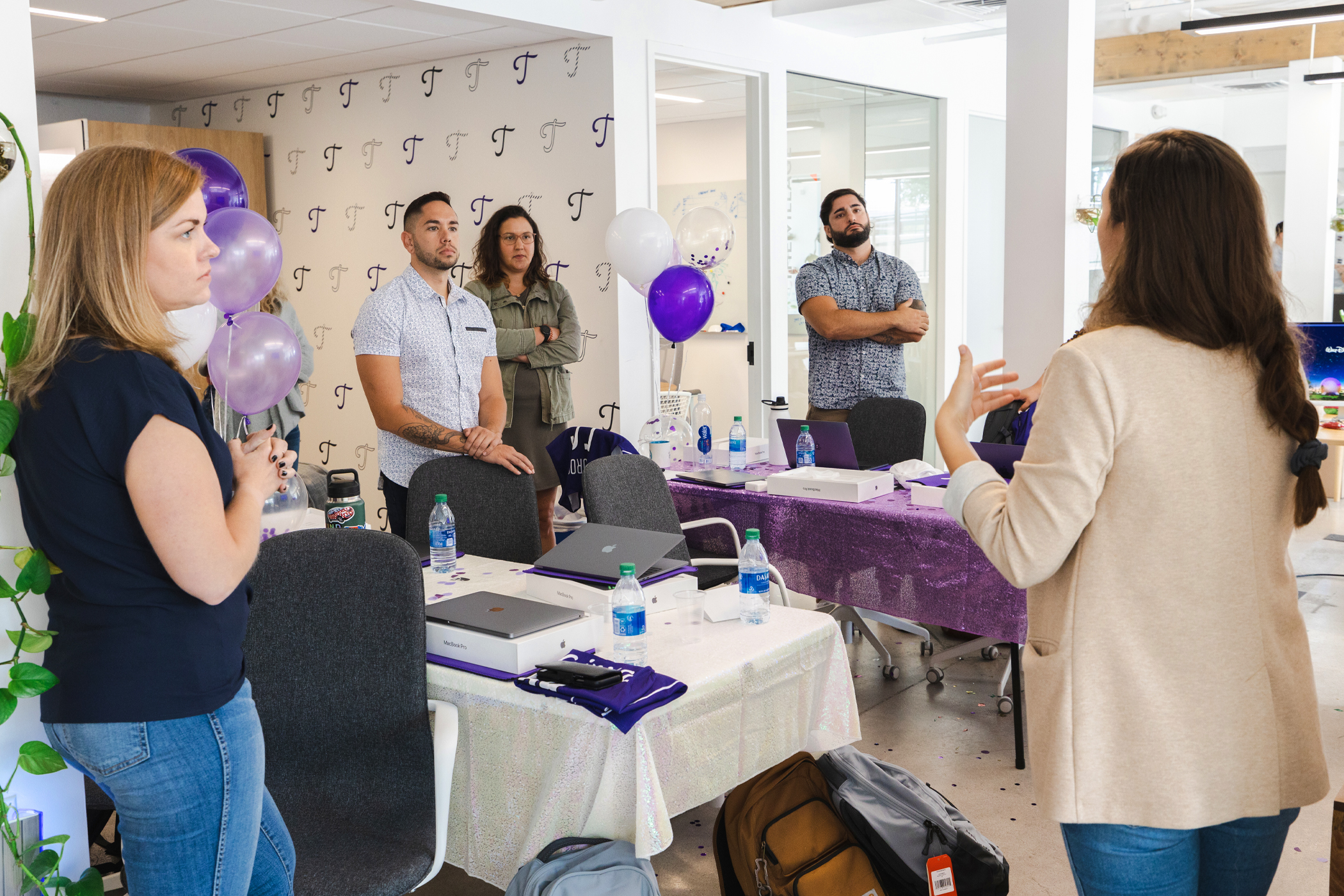
Articles
How To Create A Stand-Out Interview Process
April 3, 2021
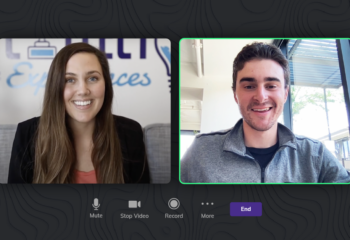
Most companies don't get the interview process right. For some, it's because their process is super sloppy - leaving a bad first impression. For others, it's their interrogation-like approach - which doesn't make candidates feel welcomed. Either way, the results are the same: these companies often hire all the wrong people.
But I get it - the interview process is tough to get right. Especially because the stakes are high, and there are so many moving parts.
And while we don't like to brag - Trainual has figured out how to nail it (I just went through it, and can vouch that it's great).
👉 Don't just take my word for it. See what our employees (and ex-candidates) have to say about our interview process. Look on Glassdoor.
So, I'm here to break down Trainual's exact interview process. And I'll even give you insights into what it was like when I went through it first hand. That way, you can get it right (and hire the right people for your business) - every time.
How long does the interview process take?
How long the interview process takes really depends on the role you're filling and your team's bandwidth. But generally speaking, you'll want to aim for 3 to 4 weeks from the first interview to the offer, with roughly 4 interviews per candidate.
That way, your open position doesn't sit open too long. So, your team can get back to their normal responsibilities. And you can get the extra hands your team needs ASAP.
To fit all these interviews in this timeframe, try not to have candidates wait more than 4 business days between their interviews. And as soon as you know that they're moving onto the next round, let them know.
Because if you're trying to attract top-tier candidates (why wouldn't you be?), they are likely interviewing at other places as well. So, the more efficient your interview process is, the more likely you'll get the "yes" from your all-star candidates (before someone else does).
Who coordinates the interview process?
While you'll have tons of hands involved in your hiring process (hiring managers, People Ops, and the team), only one person will own the process. Typically, this is someone on your People Ops or HR team who will act as the candidate's main contact point throughout the interview process.
This person will own the prep work, screen candidates, and handle the interview process's logistics. That way, everything is organized - and it won't feel like there are too many cooks in the interviewing kitchen.
As you start scheduling interviews, just make sure to tell your candidates who they should get in touch with if they need anything. This will streamline communication throughout the process.
To make our hiring and interview process even easier, we have People Ops Generalists assigned to certain departments.
For example, we have one who owns the process for Engineering roles. And another who owns the process for Marketing roles. That way, we don't have to discuss who will take on a hiring initiative - when we know what we need, we can jump right in.
Use your standardized interview process
If you're like most companies, you're probably thinking, "my what?" But a standardized interview process gives you an exact roadmap to make sure every candidate gets the same exceptional interview process.
And that matters! Because 83% of interview candidates say that an unimpressive job interview can negatively change their mind about the job and employer.
And depending on how bad the interview is, you could be looking at unhappy Glassdoor reviews that'll stop great talent from applying in the future. After all, about 50% of candidates look at these reviews before they apply to a company.
So, before interviewing anyone, make sure the entire interview process is planned from start to finish. And have every step of the process (including best practices) documented.
Because if it's written down, anyone in your company can recreate the process. So, every candidate - no matter the role - gets the same stand-out interview process.
If you don't have your interview process documented yet, get your interview squad involved! After each person runs their part of the process, have them document exactly how they did it. Then, put it all in one centralized location - so anyone on your team can access it later.
🔥 Tip: Trainual is the #1 documentation and training tool that puts all your company's need-to-knows in one place. Try for free.
Step 1: Do the prep work
To get the interview process right, you'll want to start long before you start taking resumes. In fact, roughly 60% of the process happens well before you even get to that point.
This includes everything from identifying what you're looking for in a candidate to the questions you'll ask to how you'll remove biases. If you don't, you'll leave most of the interview process to chance (which basically means a lot can go wrong).
So, before you start inviting candidates to interview, here's, bare minimum, what you need to prepare:
1. What are you looking for in a candidate?
Plainly put, knowing exactly the type of candidate you want to hire from the get-go increases your chances of finding the right one. Because knowing what you want helps you ask the right questions. So, you'll get the information you need to determine who's the best person for the job.
Start by taking a look at the job description you posted early in the hiring process. And make a list of:
- The skills the ideal candidate has
- Experiences they bring with them
- The values they embody
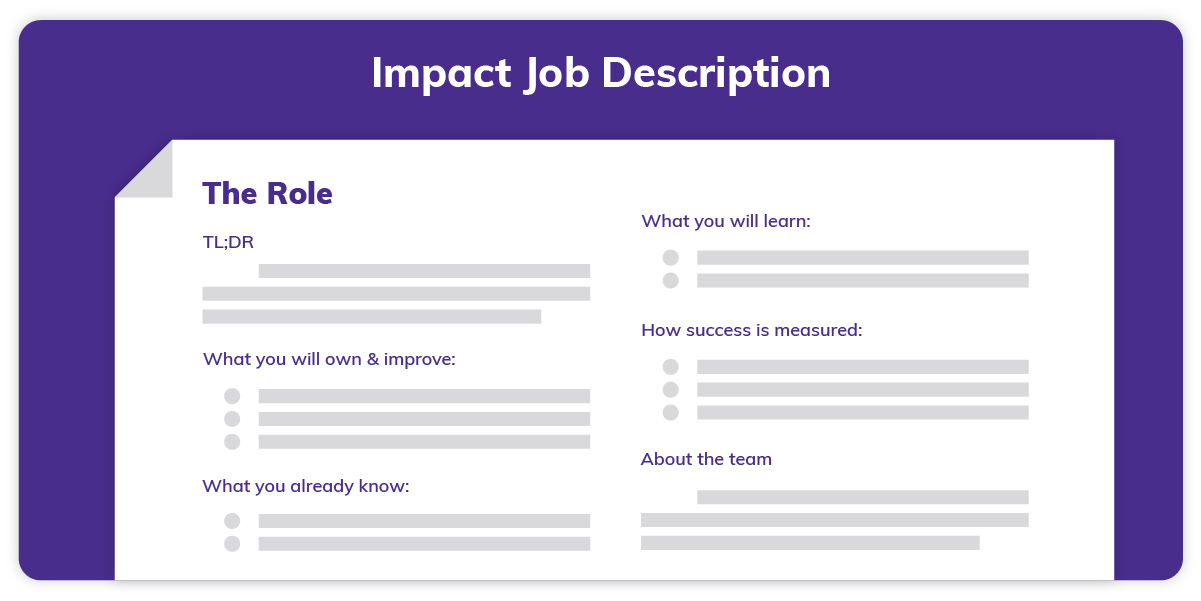
Think of this list as your north star. Meaning, these are the non-negotiable "must-haves" for the role. And let it inform who you invite to interview and who moves on to the next round.
Here at Trainual, we'll take this one step further and add clear, measurable criteria for the skills and qualities an ideal candidate should have. That way, the interview process becomes as scientific as possible - and we remove any possible biases.
For example, we want our engineers to be incredible problem solvers. So, we ask them about technical problems they've tackled.
Then, we give them a candidate project where they take on a real problem Trainual's product has had in the past. And we test-drive how they think about problems and if they have the skills to do the work.
This way, we can objectively see if they have the skills they need. Not just hire who said what we wanted to hear.
👉 Haven't created the job description for your role yet? Get started with our free job description template.
2. What are you not looking for in a candidate?
Knowing what you don't want in a candidate is equally important as knowing what you do want. That's because you can pass on the candidates that show red flags during your interview process - without needing your team to stop and discuss it.
And while this might sound harsh, it literally pays to be picky in your interview process. Because chances are good if you hire the wrong person, they'll be offboarding in less than a year. And you'll be spending up to 30% of the role's salary fixing mistakes and finding a replacement.
At Trainual, we have a standardized list of automatic candidate disqualifiers that we use for all roles. And just like the traits we're looking for, these are non-negotiable.
For example, we won't hire people who:
- Don't embody all of our core values
- Want something fundamentally different than the role they applied for
- Are rude, discriminatory, or just generally unpleasant
- Don't know anything about the company or the role
Plus, if there are any role-specific disqualifiers (like not knowing an integral skill for the role), we also add those here.
Ideally, these disqualifiers should be screened in the first touchpoint with your candidate in the interview process (we'll get to that). That way, you don't waste your company's (or the candidate's) time.
3. How will you measure candidates' success?
To make sure personal biases (like having the same favorite sports team) don't sway your decisions, you need objective criteria for measuring candidate fit. That way, you hire people based on what really matters - the skills and experiences they bring.
And the easiest way to do that is with a hiring rubric. AKA an objective and standardized tool that all hiring managers involved in the interviewing process use to inform their decisions. It includes:

What competencies the candidate will have
This includes any hard skills related to the job, like writing sales copy that converts. And any soft skills related to cultural fit, like being a team player.
When you'll measure those qualities
This makes sure each stakeholder knows what they're responsible for measuring. But most importantly, it avoids each interview feeling like the candidate is stuck in Groundhog Day! After all, it's painful to answer the same interview questions repeatedly - not to mention, it wastes a lot of time.
How you'll measure these qualities
AKA the interview questions that will get you the information you need. But don't forget to look for cues beyond the candidate's answers that let you know if they're a good fit. For example, if you need a team player, check to see if they use "we" instead of "me" when talking about their past accomplishments.
At the end of each interview, the interviewer will jot down how well the candidate fits each criterion in a feedback form. And they should cite specific examples that back up their assessment.
4. What will you ask to get these metrics?
Along with getting to know the candidate personally, your goal in each interview is to get the information you need to fill out your hiring rubric. And that won't happen by happy accident.
You'll have to be strategic with the questions you ask. Meaning, each question (except the "get-to-know-you" ones) should check a box on the qualities you want in a candidate - both from a skillset and a cultural perspective.
But to do it right, you can't ask leading questions. This will only get an automatic "yes," even when the answer is no. So, opt for open-ended questions instead.
For example, imagine you're looking for a customer experience role. And your rubric says you need someone who can resolve customer requests. You might say: "tell me about a time when you handled and resolved an issue a customer had," rather than "have you ever dealt with customer requests?"
To make the most of your time, you can (and should) prepare your questions before the interview. This way, you can get the answers you need in the hour-ish that you have with the candidate. And there won't be any awkward silences.
Just make sure when you're asking your prepared questions, you don't sound like a robot. An easy way to do this is to personalize the questions to the candidate's background. Meaning, if you're asking about a specific skill in their last role, mention the role and the company by name.
Step 2: Get your interview team aligned
As I said earlier, you're going to have lots of people involved in the interview process.
So, use your company's communication tool (like Slack) to create a "group chat" with all the stakeholders around the role. This way, you can instantly update everyone as things start moving. So, everyone stays on the same page.
Plus, you want to make sure all your stakeholders put your company's best foot forward. Because the candidate is interviewing you too!
So, make sure every stakeholder goes through your company's interview training before the first interview. That way, everyone knows what to do - and can answer any questions your candidate has. And your People Ops team doesn't have to spend hours answering the same questions.
🔥 Tip: Trainual makes preparing your team for the interview process easy. And you can even test that they fully understand what to do before they speak to candidates. Try for free.
Step 3: Book the first round of interviews
The first interview should be just an initial screen with someone on your People Ops team to see if a candidate fits your company's values. And if they seem to have the basic skills needed for the job (beyond what's on their resume).
That way, you're able to narrow the candidate pool to only the best of the best. And your hiring managers don't waste time chatting with people who aren't close to what you're looking for.
Just keep in mind that the candidate isn't the only one being screened. This is also an opportunity for them to screen you! So, you want to make sure to make your first impression count! And that you really sell your company as the best place to work.
One way to (subtly) do this is by sending a scheduling link to candidates you want to start the interview process with - instead of just asking when they're available.
This way, you break the good news that they have their first interview. But you avoid the constant back-and-forth that comes with finding a time that works for everyone. And it gives the candidate some flexibility so they can pick a time that best fits their schedule.
When we schedule our phone screens at Trainual, we send them an email to give them a heads up. And then, we send an "easy book" link via Lever, our applicant tracking system.
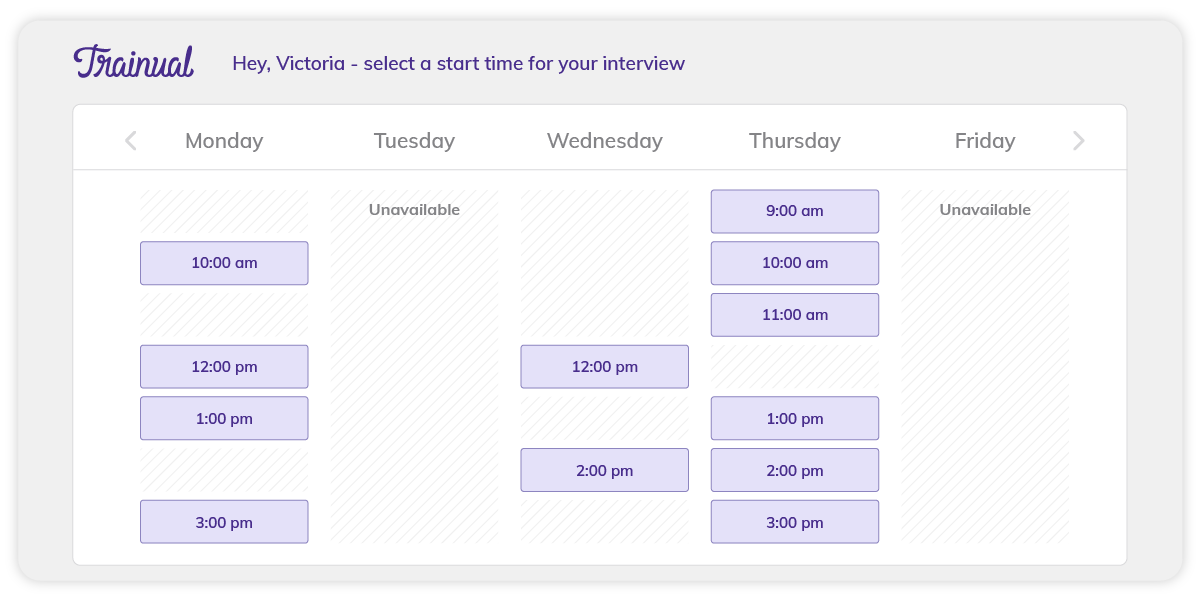
Once scheduled, the person who owns your interview process should add an invite to everyone's calendar with the Zoom link for the interview.
You'll wash and repeat this step - sorting out all the top candidates. That way, you have a good-sized talent pool to run with.
Step 4: The initial phone screen
The interview process can be one of the most stressful life events for candidates. But you can help calm their nerves by making your interview process as personable and welcoming as possible.
Especially for that first phone screen (or Zoom screen as the case may be), think of it more as a casual get-to-know-each-other conversation. And be sure to acknowledge what the candidate shared before moving onto the next question.
When the conversation starts to go stale, filter in one of your prepared questions. And try to gauge if they fit your company culture, are excited about your company, and if the role is what they're looking for.
You'll also want to note the general impression they give (like tone and mannerisms) as much as possible. For example, here at Trainual, one of our core values is to show up ready. If a person shows up late or doesn't seem prepared, that will suggest that they might not be the best fit for our company culture.
Why this stands out
Admittedly, I had butterflies before my initial phone screen. But a few minutes into the Zoom call, they all went away. From the get-go, I was treated with enthusiasm, warmth, and small talk that felt welcoming.
And even when the interview questions started, the pressure didn't return. Because all the way through the interview, it stayed conversational. And it felt like Trainual was interested in me - not just filling their roster.
Plus, they were super transparent about what I should expect next and how the interview went. This was huge. Especially since 94% of candidates (including myself) really want interview feedback, so they're not guessing how they did.
But only 41% of candidates actually get feedback. So, that's why Trainual stood out from the other places I was interviewing with.
Step 5: Choose who moves to the next round
As soon as the interview ends, have the interviewers give feedback on the candidate.
Following the initial screen, only the People Ops person will provide feedback. But later interview rounds will have several interviewers, and all of them will provide feedback.
To make sure the feedback is apples to apples, use a standardized feedback form. That way, it's easy to gauge who should move on to the next round.
And make sure there are open-ended questions, so your team can elaborate on their thoughts.
At Trainual, our feedback form collects if the interviewer would recommend the person, general vibes, and a summary of the interview experience (from their perspective).
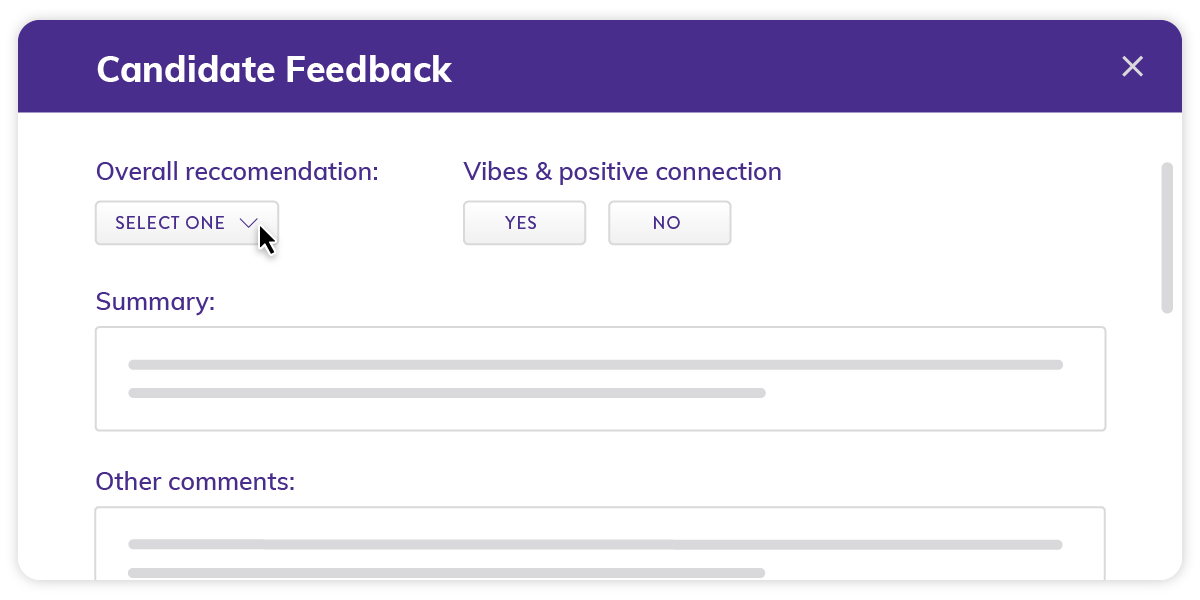
We send this feedback form through Lever, so interviewers get it as soon as the interview is over. And they can immediately provide feedback - while everything is still fresh in their mind.
🔥 Tip: Before your team submits feedback, use Trainual to host a team-wide bias training. That way, your team can be more aware of their personal biases to impact your interview process. Try for free.
Step 6: Preparing the candidate for the next interviews
Yes - you read that right! After letting a candidate know they're moving on in the interview process, send them a ton of information about your company. That way, they know what they're potentially signing up for and what to expect next.
Plus, we look at it this way: candidates send us their resumes to prepare us for the interviews - so this is the least we can do!
We'll include:
- Our mission, values, and vision
- A glimpse into what our culture is like
- What onboarding looks like at Trainual
- A breakdown of our benefits and perks
- Interviewing best practices
And we ask candidates to quickly introduce themselves using a Loom video or a short bio (depending on what they're most comfortable with). We'll then send it in the role's group chat, so all the stakeholders get to "meet" the candidate at once! This way, the candidate doesn't have to give the same rundown 10 times.
But bare minimum, you should give candidates a more in-depth introduction to your company, mission, values, and interview best practices.
🔥 Tip: Send all this information in a Trainual Subject, so you can track whether or not a candidate actually goes through the information. Try for free.
Why this stands out
For me, this was the first time I've ever had a company prepare me for an interview with them. But it was a total game-changer.
I got a ton of the small questions answered right off the bat. And I was able to focus on asking deeper questions about the role during my interview.
Plus, it sent an amazing signal to me. If Trainual was willing to prepare me for success in the interview process, they'd prepare me for massive success when it came time to onboard (and they did)!
Step 7: Hiring manager interviews
You definitely want the direct manager to like the candidate you hire for the role. Otherwise, it'll be a lot of long hours working together. So, the next person to interview the candidates that moved on should be the direct manager (and any other hiring managers).
This also allows the candidate to ask more role-specific questions. And to learn more about what their day-to-day tasks will look like.
Before the interview, make sure the direct manager has everything they need to know about the candidate. This includes the feedback from the initial screen, the candidate's resume, and a prepared list of interview questions.
You'll want to make sure that your hiring manager's questions are different from those People Ops asked. That way, you'll get new information to help you decide if they're the right fit for the role - not just rehearsed answers.
At Trainual, we use our second (and sometimes third) interview for diving deeper into the role. So, we'll ask more specific questions about a candidate's skills and experience.
Whatever the purpose of the interview is, you still want your hiring manager to connect with the candidate personally. Because they'll be spending a lot of time together if the person is hired!
So, don't just talk shop. Have your hiring manager ask about personal interests, goals, and hobbies too.
And with roughly 10 minutes left in the interview, allow the candidate to ask any burning questions they may have. (Remember, they're interviewing you too!) And if they don't ask any questions, try not to overthink it - it could just mean you answered them all already.
The hiring manager will give their feedback. And you'll repeat the same process for picking who moves onto the next round.
Why this stands out
When I got to my second interview, I had a feeling it was going to be way more technical and skill-based. Especially since the person interviewing me would become my boss!
But again, all the pressure was taken off right at the start. Because the hiring manager asked about me - on top of my skills and experience. And they genuinely cared about my answers. So, it didn't feel like I was being "assessed."
And even my questions (I had a lot of them) were met with enthusiasm. At the end of the interview, they even gave me their email if I had any other questions. This was a huge win in my books - because it clearly communicated that they would be there for me if I was hired.
Step 8: The candidate project
Admittedly, every candidate is going to tell you they're great (and they probably are). But why not double-check that they're not all talk and no walk? Enter the candidate project stage of the interview process.
This will help you test-drive your candidate's skills in action - and gauge their passion for the role. And it'll let the candidate see first-hand if they like the job (before they're hired). Because if they actually like the work, they'll perform better in their role and stay longer at your company.
We always make sure the candidate's project is similar (if not identical) to the work they'll do in the role. And that it tests a few of our non-negotiable skills listed on our hiring rubric.
Ask your current team to come up with the prompt. Then, have a member of your People Ops team email it over with any instructions and a clear due date to all remaining candidates.
Remember that your due date should accommodate their work schedule, so it should be at least 5 business days later. And give them the option to call or email back with any questions.
Speed up to the due date, and schedule a time to bring the candidate in and present it. Everyone involved in the hiring process will review what the candidate hands in. (You'll want to tap in any team members who'll work closely with the role too.)
Only the candidate with the best project (measured by the hiring rubric) should move onto the final round!
Why this stands out
Answering the technical questions on the spot during an interview sucks. I feel like I speak for most people when I say that nervousness always seems to get in the way of me producing my best work.
So, when Trainual gave me a chance to show them what I've got instead, I was stoked! (And I know for a fact a lot of my teammates feel the same.)
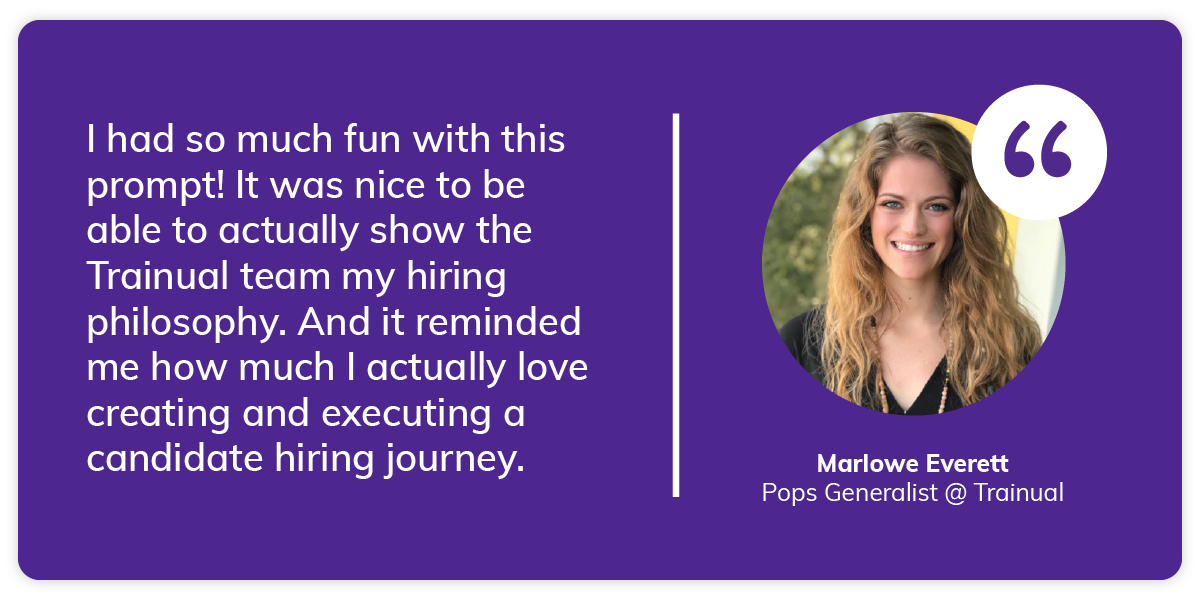
As a Marketing Generalist candidate, I was asked to write a blog post about Trainual's interview process (which has since evolved into this blog post).
And it was a blast. But what got me most excited is that it made it super clear that Trainual only hires high-impact team members. So, I could expect high-caliber teammates who love what they do.
And that only made me want to join the company even more (I was already pretty sold on it by this point). Because that's exactly who I wanted to be working with!
Step 9: The team interview
Finally, have the top candidate meet the team! Specifically, the people in the department they'd work with in the role.
At this point, you probably know whether the top candidate is a good fit for your company. But this is your chance to confirm that they're the right one. And the easiest way to do that is by making sure they mesh with your existing team.
But, admittedly, meeting people in a group setting can be extremely awkward (especially on Zoom). So, make it feel as natural as possible by having your team members prep their questions in advance. Just let everyone on the team know who's asking what questions to avoid confusion.
And kick off the team interview with a quick meet-and-greet. Meaning, have all your team members introduce themselves and what they do. Then, let each team member ask their questions in a round-robin. And invite the candidate to jump in with their questions at any point.
As soon as the team interview is over, we like to schedule a debrief with the team to gather feedback. And we explicitly ask if all the team members can see themselves working well with the candidate. This is our team's opportunity to raise any concerns.
If there is no hesitation, we're ready to make the offer!
Why this stands out
I personally find team interviews really difficult. But Trainual made it, so there was never a moment of painful silence.
Instead, it really was an hour of me getting to know all the personalities I'd work with - if I got the job. And it settled any remaining nerves that I might join the team and not vibe with anyone. At this point, I was 100% sure that I wanted this job.
Step 10: Make the offer
Since this is a big moment for your candidate (and your company), you want to make it special!
At Trainual, we want to show the candidate that the whole team is excited to have them on board. So, rather than just calling the candidate to give them the good news, we’ll hop on a Zoom call with a few different team members there to help make the offer!
This typically includes the People Ops Generalist, the Head of People Ops, and all the hiring managers. And we let them know exactly why we chose them for the role (it’s a huge ego boost).
Then, we let them know their planned start date, compensation and that an offer letter will be sent right after the call.
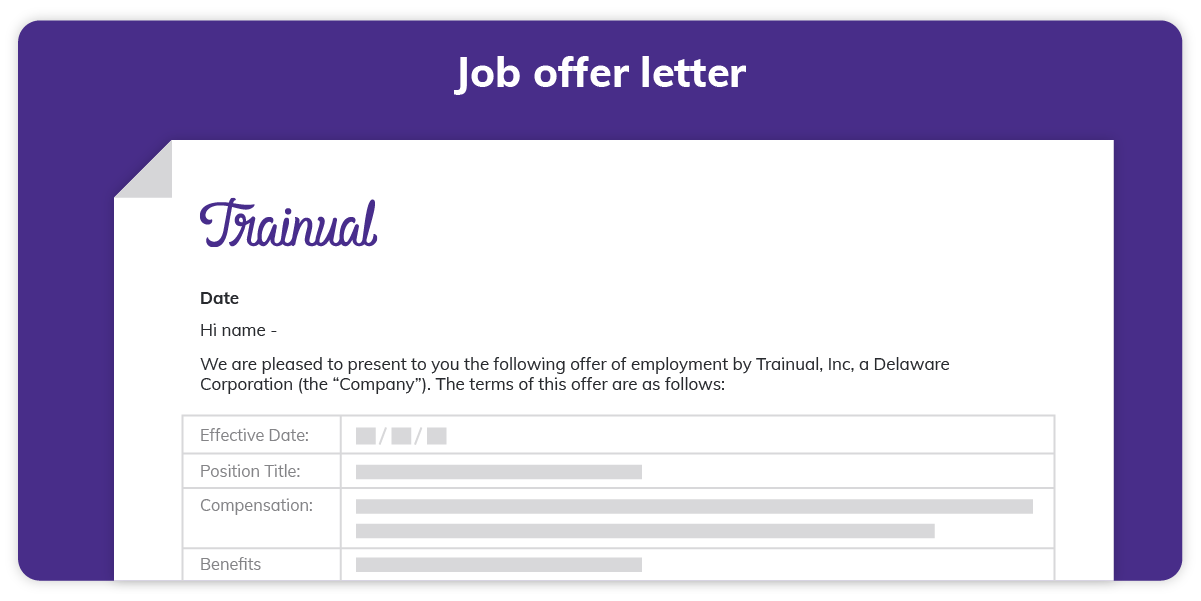
That way, they have everything they need to make an informed decision. And of course, leaving the chance for the candidate to ask any questions if needed!
Why this stands out
I won't lie - it was one of the happiest days of my life when I got the call! And it was definitely the warmest job offer I ever received because it felt like I was already part of the team.
In fact, I even gave a verbal acceptance on the spot. All because they gave me everything I needed to know - and they slayed my entire interview experience. There wasn't a doubt in my mind (and months later, it still isn't) that this is the right team for me.
But even if you decide to stray from Trainual’s interview process, do whatever you can to make the experience enjoyable (for you and your candidates)! Because the world already has too many boring interview processes. And standing out from the crowd means securing top talent and scaling your team!
Similar Blog Posts





.png)
